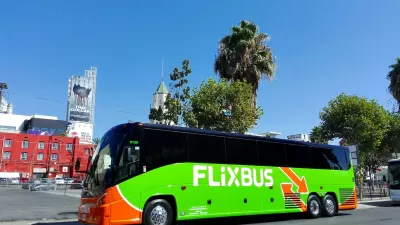As the loss of intercity bus services and stations continues, Chicago could become the largest city in the developed world without a major downtown bus terminal.

Intercity bus passengers in Chicago worry they could literally be left out in the cold just as the busy holiday season approaches, reports David Schaper for NPR, if the downtown Chicago bus terminal, the largest intercity bus connection hub in the Midwest, shuts down.
Bus companies have been slashing intercity bus service and shuttering terminals around the country, forcing passengers to wait outdoors on sidewalks or in poorly lit parking lots with no access to restrooms, ticket agents, or other amenities.
FlixBus, Greyhound’s new owner, secured a temporary, month-to-month lease on the terminal, but the company has declined to estimate how long the lease might last.
Director of DePaul University’s Chaddick Institute Joe Schwieterman stressed the importance of intercity bus service, saying, “You take away connecting points or push people out on the curb to wait, and that whole network just unravels. So it's hugely important for mobility, heavily for people with low incomes, disabled community and many others.”
According to the article, “City officials are in talks with Greyhound and other entities to try to find another location with an indoor waiting area, but there's been little progress thus far.” The CEO of Flix North America is calling on Congress to support intercity bus service by funding bus infrastructure in the same way it funds airports, passenger rail, and other public transit.
FULL STORY: Chicago may become the latest city to lose Greyhound bus services

Trump Administration Could Effectively End Housing Voucher Program
Federal officials are eyeing major cuts to the Section 8 program that helps millions of low-income households pay rent.

Planetizen Federal Action Tracker
A weekly monitor of how Trump’s orders and actions are impacting planners and planning in America.

Ken Jennings Launches Transit Web Series
The Jeopardy champ wants you to ride public transit.

New Mexico Aging Department Commits to Helping Seniors Age ‘In Place’ and ‘Autonomously’ in New Draft Plan
As New Mexico’s population of seniors continues to grow, the state’s aging department is proposing expanded initiatives to help seniors maintain their autonomy while also supporting family caregivers.

USDOT Waters Down Self-Driving Car Regulations
The agency is reducing reporting requirements for autonomous vehicles and cars with self-driving features, prompting concern among safety advocates who say transparency is essential to the safe deployment of AV technology.

‘Minnesota Nice’ Isn’t so Nice When You Can’t Find a Place to Live
The Economic Development and Housing Challenge Program can help address the scourge of homelessness among Indigenous people.
Urban Design for Planners 1: Software Tools
This six-course series explores essential urban design concepts using open source software and equips planners with the tools they need to participate fully in the urban design process.
Planning for Universal Design
Learn the tools for implementing Universal Design in planning regulations.
Heyer Gruel & Associates PA
Ada County Highway District
Institute for Housing and Urban Development Studies (IHS)
City of Grandview
Harvard GSD Executive Education
Toledo-Lucas County Plan Commissions
Salt Lake City
NYU Wagner Graduate School of Public Service





























